
How I unearthed a Big Opportunity by Digging into Construction Budgets.
Kuldip Panchal arrived at Indiana University-Purdue University Indianapolis in 2012, ready to study construction management. He'd emigrated with his family from India to Indiana, and grew up working the front desks, pulling overnight shifts, and doing construction at the motels his family had come to own. He watched his parents sweat and struggle, and resolved that, someday, he'd help his father run his renovation projects. But on his very first day on campus, Panchal received the worst kind of phone call: His father had fallen three stories off a hotel roof and sustained critical injuries; Mahesh Panchal died eight days later. Devastated, Kuldip took time off before returning to school, got his MBA, and looked for construction-related opportunities upon which to build a business. In 2018, he launched US Hydrovac in Indianapolis, in the fast-growing field of hydro excavation. Never heard of it? Neither had Panchal. --As told to Peter Keating
After college, I got married and lived in Chicago for about a year, working for a large general contractor. My dad's thing was renovating hotels, but he would overpromise, overdeliver, and then get underpaid. I also wanted to be in construction, but I wanted to find a niche industry still in its innovative stage. A couple of my college buddies, Tyler Vuurman and Dwight Cliff, and I noticed line items for something called hydro excavation in budgets for projects. It was an emerging trend. Tyler said, "Let's start a hydrovac company." And that was it; the idea stuck.
Hydro excavation involves, basically, a pressure washer on steroids, which sits on the chassis of a semitruck. A long hose extends into the ground, shooting air and water into the dirt and creating a liquid slurry that gets sucked up into a debris tank. It exposes power or sewer or water lines without the risk of striking them with a mechanical device like a backhoe. I'm sure you've heard about contractors hitting gas lines and houses blowing up.
It's not an easy business to develop, because the equipment is expensive--one truck costs about half a million dollars. In 2017, I learned that before he died, my dad had a small partnership in a motel; when it sold, I inherited about $125,000. That was my mom and dad's life's work, and, in my mind, the money had to be invested back into the family.
I quit my job, and my wife and I moved back to Indianapolis, where my partners and I knew something about the construction market.
We did our due diligence for six months. We read whatever we could on hydro excavation--there wasn't much. And we started US Hydrovac with two truck operators and my inheritance--which lasted about three months. I had to ask my wife's parents for more money, and luckily, they were able to loan it to us.
In the beginning, I was the sales guy, the head of business development, and--if we needed extra labor--I would get in the hole. People would say, "Is this the owner of the company?" And I'd be like, "So what?" Over time, Tyler, who landed our first five accounts, took less of a day-to-day role in the business, and Dwight sold his stake.
The company that dominates hydrovac is Badger Daylighting, which basically created this industry 30 years ago in the oil fields of western Canada. It's a public company with over $500 million in annual revenue, and services the entire continent. There really weren't regional players until we came along. We hustled. We chased the work, we chased the customers. We had to.
As our company grew, I looked for people in construction who were long on dedication. My number-two man is a guy three years older than I am who had been overworked and underappreciated at his last company. This dude is amazing, and he cares about me and the company more than anyone else would. About two years in, we added complementary services like pipeline assessment--basically sending a robotic camera down water and sewer lines to inspect and clean them. We now have 35 employees and 12 crews, and we did $6.3 million in revenue in 2021.
When Covid hit, some transportation departments sped up projects because there was less traffic on the road. That kept us afloat through that first critical part of the pandemic. Then we got some massive projects. In Louisville, a brick sewer that's eight feet in diameter and more than 100 years old runs down Broadway, and in 2020 it started caving in--they had sinkholes in the street. We were there for 10 months.
That's us. When your toilet's not working, when your power's not working, that's when we're on the call. It's not really glorious, but we've got a niche. It's interesting. And the industry is booming.
Source: https://www.inc.com/magazine/202209/peter-keating/ushydrovac-construction-kuldip-panchal-inc-5000-2022.html


.png)

























